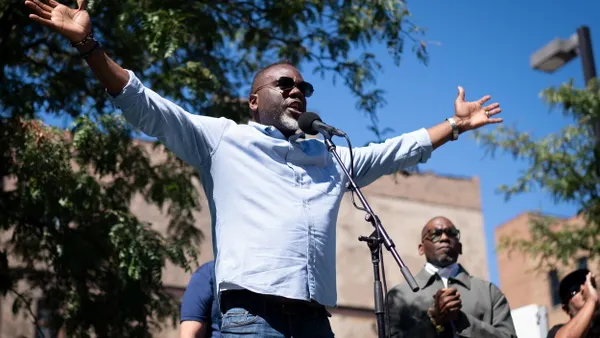Dive Brief:
- In response to national conversations around racial equity and inclusion, startup accelerator CivStart this week released a Framework for Inclusive Govtech Ecosystems, and announced a task force to help inform and enact tangible actions that influence diversity in govtech.
- The framework report identified a number of opportunities for entrepreneurs, nonprofits and investors to consider in developing diverse govtech ecosystems: be a better customer; provide support and resources; de-risk govtech innovations; diversify investors and networks; and spur innovation from local and state levels.
- Using the findings of this report, CivStart's Inclusive Govtech Task Force will work to identify tangible actions that can be taken across govtech to ensure inclusive growth. The group will include about a dozen representatives from government, nonprofits, venture capital (VC) firms and corporations, yet member names have not yet been shared.
Dive Insight:
In February 2020, CivStart convened a focus group of govtech leaders to discuss how to increase diversity in the space — a conversation that spurred the group's findings in its new framework. The onset of the COVID-19 crisis delayed CivStart from releasing the framework, but the nation's recent focus on racial inequities presented an opportunity for CivStart to share the findings and announce a task force.
As a Black entrepreneur, CivStart CEO Anthony Jamison said he felt especially drawn to helping underrepresented entrepreneurs navigate an often challenging business landscape.
"From a personal experience for me ... I found myself getting extremely frustrated with the process of creating a startup in the beginning," Jamison told Smart Cities Dive. "Identifying those roadblocks and those barriers, those were things that I felt like I had to deal with a lot more significantly than individuals who don’t look like me.
"I didn't want anybody else to have to go through that if we had the ability to help," he continued. "If all we had to do is provide them with a supportive ecosystem, provide them with knowledge, provide them with access to resources and capital and things like that, then why don’t we do that?"
Jamison said he was not alone in his experiences, having seen other underrepresented entrepreneurs get passed up on investment opportunities or cut out of partnerships due to their race.
"They don't have the champions that your traditional entrepreneurs have," he said.
Providing tangible actions and resources to support underrepresented entrepreneurs — as CivStart hopes to do through the task force — can be just as important as providing entrepreneurs with capital, Jamison said. He noted that many institutions overlook the value that such resources can bring to Black and Brown entrepreneurs, instead leaning on wealth as a primary factor of success.
"Yes, generational wealth is always a huge pain point but there is also generational knowledge and there's generational access. And those are things that are really overlooked by ... the institutions that say they’re providing these resources to underrepresented entrepreneurs," he said.
In an effort to create manageable change, CivStart hopes to launch a regional cohort program that would support diverse entrepreneurs by fostering collaboration with regional and local governments and helping them to think about their procurement processes and how to de-risk innovation. Jamison hopes other accelerators and startup incubators are brought into the fold in creating such regional programs.
"We want to make sure the ecosystem as a whole is supported," he said. "We don’t believe we're the only players who should be doing this, we think that everyone should be doing this together, and our goal is to convene all of these people together to roll out this approach."
Chief Impact Officer Nick Lyell said CivStart is "definitely committing to doing better in the future" to diversify its own startup cohorts. Lyell said underrepresented entrepreneurs make up about 40% of CivStart's inaugural cohort, but he hopes to see that flipped in the next cohort, which will be announced in late summer.












